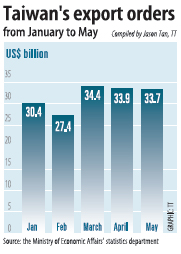Export orders expanded 34 percent last month from a year earlier to US$33.7 billion, marking the third-highest amount on record, thanks to rising demand for panels, computers and handsets.
“The debt crisis in Europe apparently didn’t impact the orders much,” Huang Ji-shih (黃吉實), director of the Ministry of Economic Affairs’ statistics department, told a press conference.
The monthly record was set in March with US$34.4 billion in orders, followed by US$33.9 billion in April.

Taking PC-maker Acer Inc (宏碁) as an example, Huang said its sales still grew last month even though European markets account for about 60 percent of the company’s total exports.
Acer revenues were up 36.4 percent last month from April to NT$50.5 billion (US$1.6 billion), despite the European debt crisis. The company had previously voiced concern that the competitiveness of its Europe-bound exports could be hurt by a weakening euro.
The department said cumulative orders for January to last month totaled US$159.9 billion, a rise of 42.7 percent from last year.
China placed orders worth US$9.5 billion last month, a year-on-year growth of 34.3 percent, while European orders rose 42.2 percent to US$5.6 billion. Japan placed 47.6 percent more orders to US$3.9 billion, Huang said.
Six ASEAN nations ordered US$3.1 billion in products, an increase of 31.1 percent from a year earlier.
Orders for the precision machinery sector, including panels, hit a high of US$3.4 billion. Orders for information and communications products — consisting of handsets and notebooks — rose 39.3 percent from a year earlier to US$8.2 billion. Electronics, which include semiconductors and memory chips, rose 32.8 percent to US$8.3 billion.

MORE VISITORS: The Tourism Administration said that it is seeing positive prospects in its efforts to expand the tourism market in North America and Europe Taiwan has been ranked as the cheapest place in the world to travel to this year, based on a list recommended by NerdWallet. The San Francisco-based personal finance company said that Taiwan topped the list of 16 nations it chose for budget travelers because US tourists do not need visas and travelers can easily have a good meal for less than US$10. A bus ride in Taipei costs just under US$0.50, while subway rides start at US$0.60, the firm said, adding that public transportation in Taiwan is easy to navigate. The firm also called Taiwan a “food lover’s paradise,” citing inexpensive breakfast stalls

TRADE: A mandatory declaration of origin for manufactured goods bound for the US is to take effect on May 7 to block China from exploiting Taiwan’s trade channels All products manufactured in Taiwan and exported to the US must include a signed declaration of origin starting on May 7, the Bureau of Foreign Trade announced yesterday. US President Donald Trump on April 2 imposed a 32 percent tariff on imports from Taiwan, but one week later announced a 90-day pause on its implementation. However, a universal 10 percent tariff was immediately applied to most imports from around the world. On April 12, the Trump administration further exempted computers, smartphones and semiconductors from the new tariffs. In response, President William Lai’s (賴清德) administration has introduced a series of countermeasures to support affected

CROSS-STRAIT: The vast majority of Taiwanese support maintaining the ‘status quo,’ while concern is rising about Beijing’s influence operations More than eight out of 10 Taiwanese reject Beijing’s “one country, two systems” framework for cross-strait relations, according to a survey released by the Mainland Affairs Council (MAC) on Thursday. The MAC’s latest quarterly survey found that 84.4 percent of respondents opposed Beijing’s “one country, two systems” formula for handling cross-strait relations — a figure consistent with past polling. Over the past three years, opposition to the framework has remained high, ranging from a low of 83.6 percent in April 2023 to a peak of 89.6 percent in April last year. In the most recent poll, 82.5 percent also rejected China’s

PLUGGING HOLES: The amendments would bring the legislation in line with systems found in other countries such as Japan and the US, Legislator Chen Kuan-ting said Democratic Progressive Party (DPP) Legislator Chen Kuan-ting (陳冠廷) has proposed amending national security legislation amid a spate of espionage cases. Potential gaps in security vetting procedures for personnel with access to sensitive information prompted him to propose the amendments, which would introduce changes to Article 14 of the Classified National Security Information Protection Act (國家機密保護法), Chen said yesterday. The proposal, which aims to enhance interagency vetting procedures and reduce the risk of classified information leaks, would establish a comprehensive security clearance system in Taiwan, he said. The amendment would require character and loyalty checks for civil servants and intelligence personnel prior to